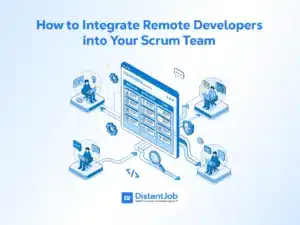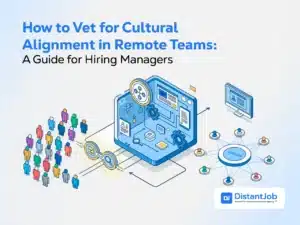Some people have been working remotely for more than a decade. Nowadays, it’s normal to embrace this new lifestyle where our office is a few steps from our bedrooms. We have all the technology we need. But 10 years ago? That seemed wild. People who decided to work remotely at that time were truly pioneers.
Sharon Koifman, DistantJob’s President and Founder, was certainly counted among the crazy people when he decided to build his business 100% remotely a decade ago. He made big mistakes but learned valuable lessons.
In 2020 Sharon launched Surviving Remote Work, a book that can be described as the ultimate remote work guide. And for those who love audiobooks we have good news, the audiobook version of SRW is out now!
In case you´re wondering, this book is not only for remote leaders and managers. It also has an entire section dedicated to remote workers with practical tips, hacks, and strategies to increase your productivity and have a better work-life balance.
Here are some of the main lessons you’ll learn from the book.
Lesson #1: Understand What Remote Work is Really About
One of the first things Sharon addresses in the book is the concept of remote work. Many people still think of a remote worker as someone on the beach drinking margaritas while working. Or that hiring a remote worker means looking for someone who charges a really low salary.
Concepts like freelancing or outsourcing are often mixed up with remote work when they mean entirely different things. And this is something that leaders need to keep in mind when they want to hire virtual employees.
It’s hard to believe, but companies still fear hiring people to work outside the office. One of the main reasons is the micromanaging monster that lives quietly in the darkest corner of most bosses’ hearts. Just the thought of not being able to glance at their cubicle makes them terrified.
If you empathize with this feeling, you probably still don’t fully understand what hiring a remote employee means.
Hiring remote workers means hiring people outside the office who still have the same responsibilities as those who work in the office. If it’s a remote company, this isn’t a problem, but it happens many times that onsite companies hire remote workers and treat them as if they are outsiders. Sharon explains that:
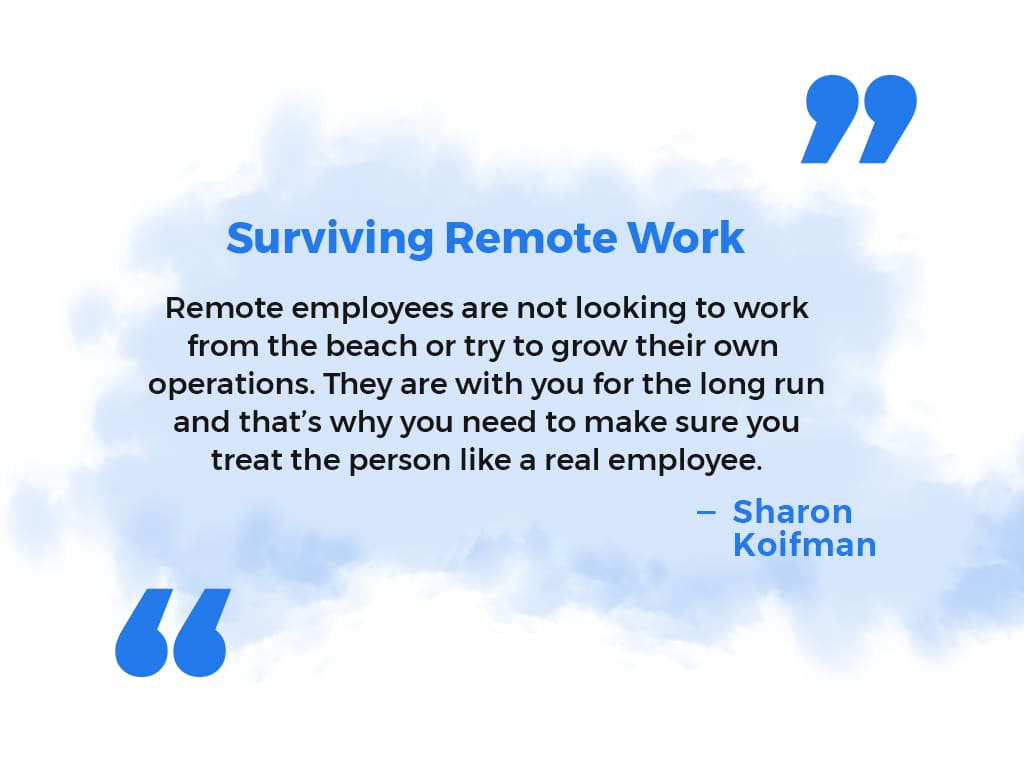
Lesson #2: Being an Asshole will Ruin Your Company
Don’t play bad cop/good cop in your company. It ruins your culture and your values.
There is this misconception that having a management style based on fear will increase your productivity rate. People will be working as much as they can because they are constantly afraid of losing their jobs. But does it work? No.
When you are in a remote environment, it’s harder to build trust with your employees because you can’t really see if they are working. One of the strategies that some managers like acquiring is creating a virtual kingdom of terror by being assholes to their employees. The results are highly stressed employees who can’t be 100% focused on their tasks.
In the book, Sharon highlights a British Study that proved that when managers were assholes to their employees, the vast majority became significantly stressed, and because of that the turnover rate increased. People don’t want to work at an office where they don’t feel valued.
“Well, who cares, if they are stressed and can’t keep up with me, it’s their problem, not mine,” – You might think.
Well, no, it doesn’t work that way.
Having high turnover rates affects business culture and profits. The same British study revealed that 15% of UK employees had experienced a toxic culture that encouraged them to quit their jobs. In numbers, this equals 97 people leaving an office of 1000. That’s almost $2 million in replacement costs.
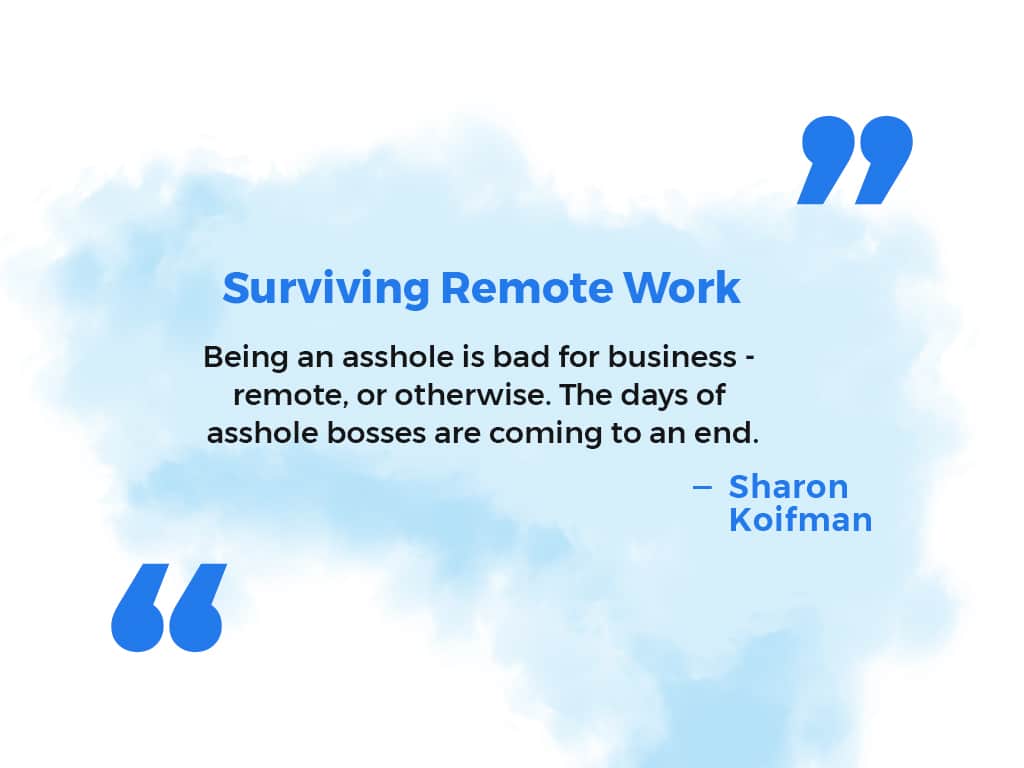
Lesson #3: Why Building Connection Matters
Culture is the buzzword these days. If you scroll down over LinkedIn or Google, you’ll see that many people provide a definition of culture that looks taken out of a textbook. And in reality, culture is not something you need to memorize to know perfectly. It’s something you need to experience.
In Surviving Remote Work, Sharon Koifman discusses why culture matters. He provides many book-like definitions, but the key takeaway from this chapter is that he shares his own powerful definition he learned not only by being the founder of a fully remote recruitment agency but by also working remotely for more than 15 years.
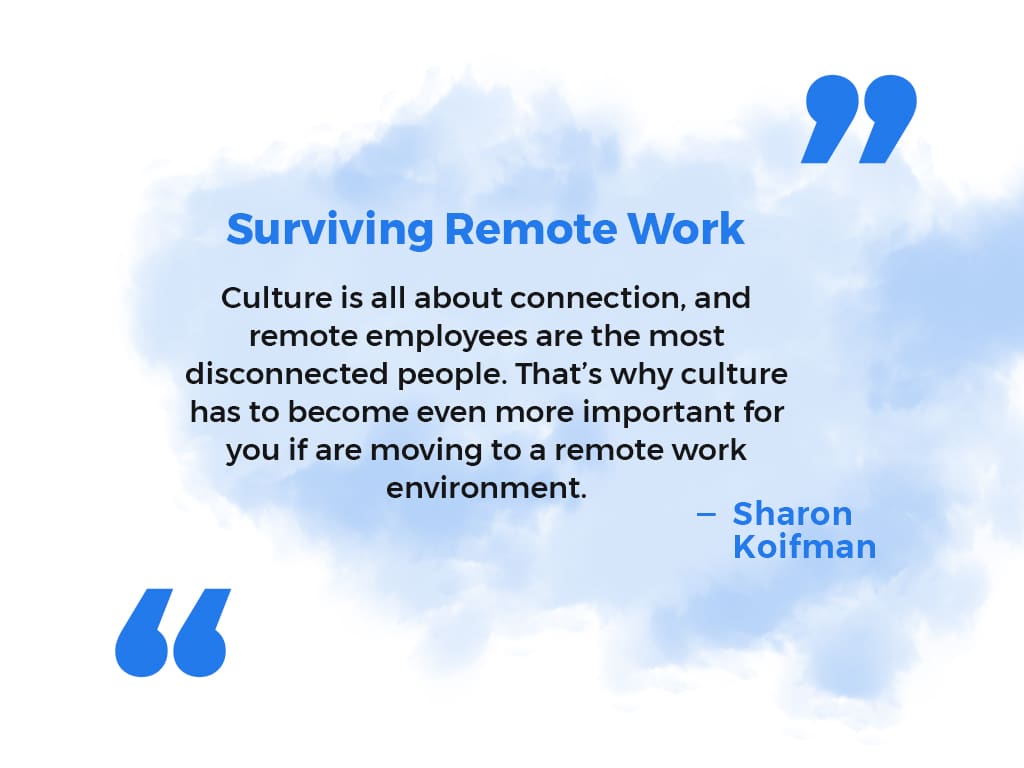
Lesson #4: Be Honest, Get Angry
Just to make it clear, getting angry doesn’t mean being an asshole. There are different types of management styles; some leaders love being assholes, while others are more passive and easygoing.
Getting angry or experiencing conflict might seem like something that leaders should avoid at all costs. But constructive conflict is not getting angry and screaming at your team that they are doing a terrible job. Constructive conflict is the space you give your team to state their opinions regarding a specific topic without getting personal or attacking someone subjectively. All this is to encourage innovative ideas and ways to improve the way you work.
Sharon suggests that constructive conflict is not only something that leaders need to encourage but remote workers as well. The point of this is to hear different mindsets, not only to encourage workplace diversity but to challenge employees to think outside the box.
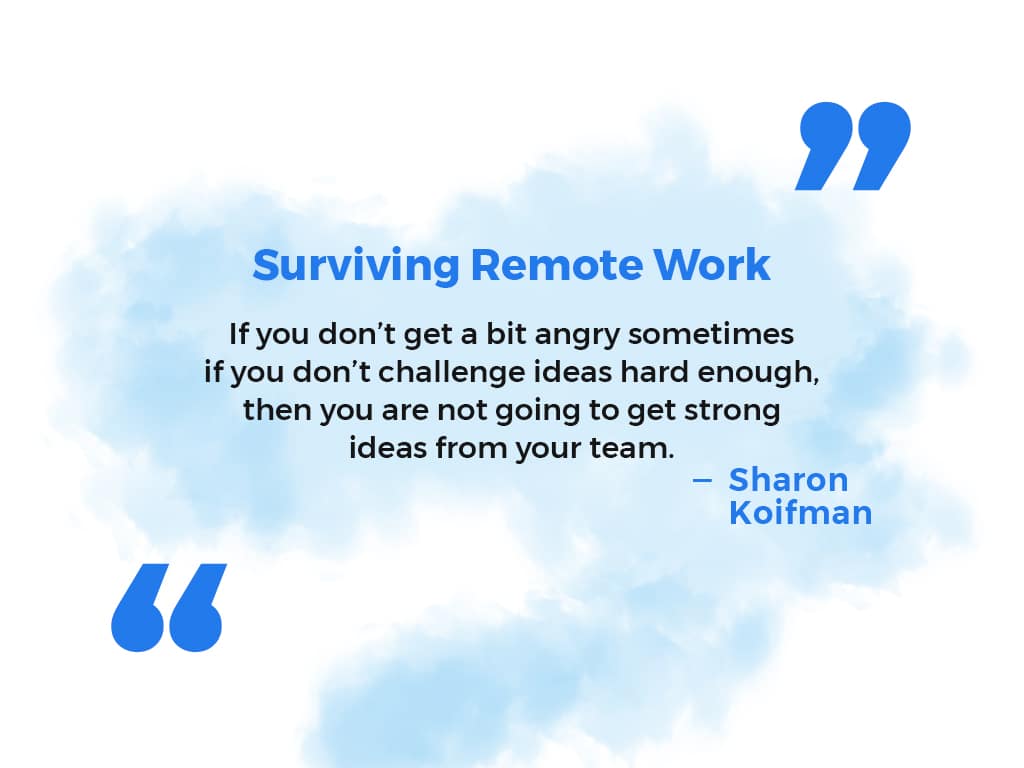
Lesson #5: You’ll Fail if You Don’t Have a Routine
Remote workers are more productive – if they have the tools and strategies to do so. There are thousands of studies that prove that remote workers are less distracted. But this doesn’t mean that you’ll automatically be more productive just by being a remote worker.
Telecommuters are productive when they have a routine settled. If you’ve been working for years in an office, it might be overwhelming when you have the opportunity to work from home. You might think that now that your annoying boss is not around you, you can do whatever you want. Wake up at 11, go to the gym, then start working at 2 and finish working when you feel tired. This is possible, but it’s not ideal. Why? Because remote workers stick to their company’s schedules. And despite the flexibility that remote work gives you, you still need to make time to work and get results.
This is why dealing with distraction by having an organized routine is the best way to get work done. Sharon talks that he struggled at first because he had an addiction to playing games on his phone and got distracted easily. But then he discovered the power of routines, it helped him live a healthier life in which he has enough time to work, time to sleep, and time to be with his family.
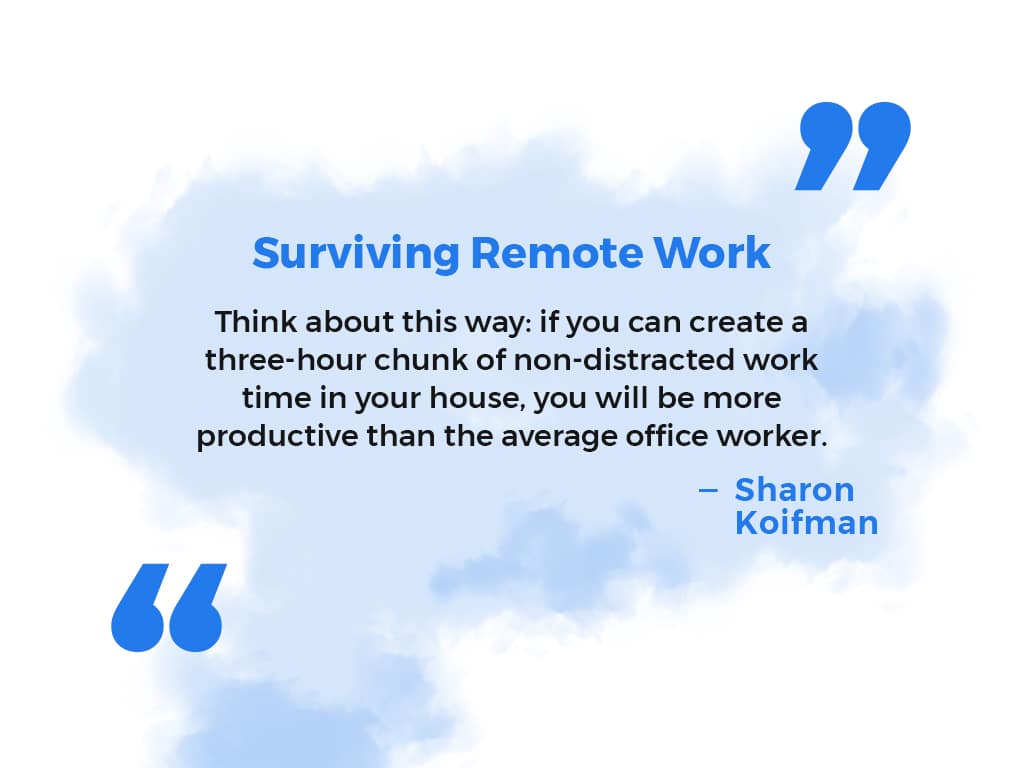
Lesson #6: Be Smart When Protecting Your Data
Security is one of the main concerns entrepreneurs have when hiring remote talent. How to ensure employees won´t be sharing sensitive information? How to protect data while managing a remote company?
The point of protecting data is not overreacting and start being paranoid while intimidating employees. This will not only build a hostile work environment but also discourage quality employees from producing results as they feel limited.
When it comes to hiring remote employees, one of the benefits is that they are less likely to have access to certain information, as there is not a central office. You decide who has access to what 100% virtually.
Yes, it’s absolutely necessary to devote attention to protecting your clients and company´s data, but without going over the top. Sharon shares his main advice and what every remote entrepreneur should prioritize regarding data protection. From encrypted company laptops and setting up VPNs to wiping and location software and enabling two-factor authentication, you´ll find everything you need to know.
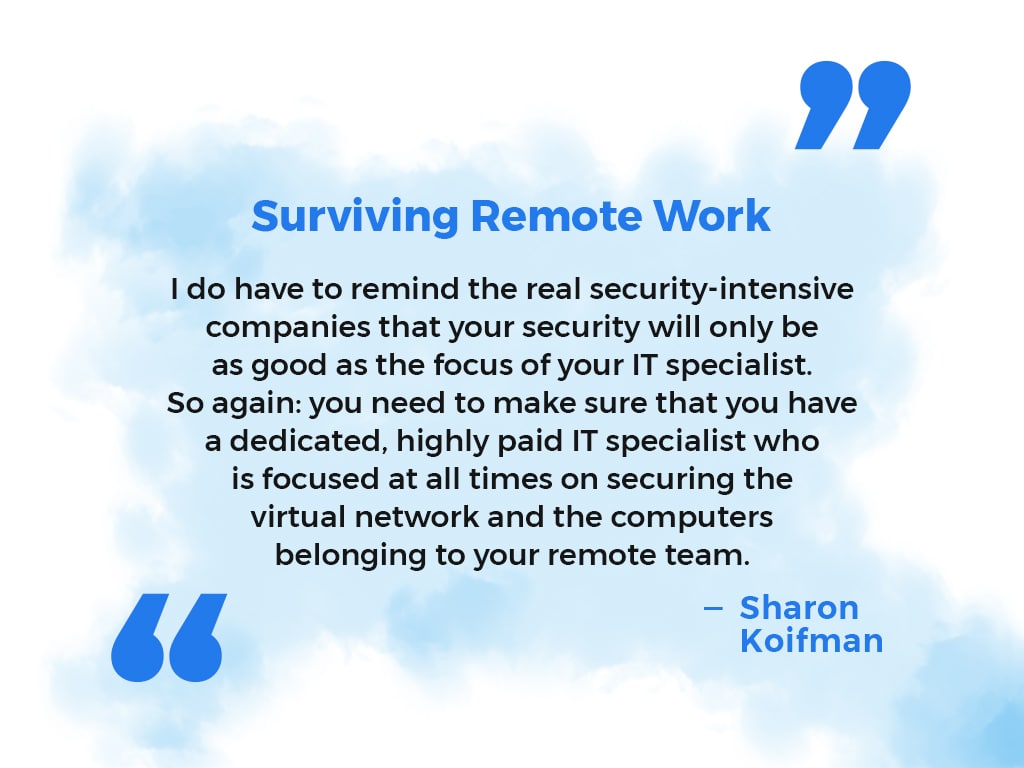
Lesson #7: Prioritize Mental Health
While remote work has endless benefits, it also comes with many challenges remote leaders need to learn how to address. And among those top challenges, you’ll find how easy it is for remote employees to start feeling lonely and burnout.
Often, remote workers are praised for being more productive. But sometimes this is due to the lack of boundaries, so they work not 8 hours but 10 or even 12. This is why prioritizing your and your employee’s mental health becomes valuable.
During the book, Sharon addresses a chapter devoted to mental health and how to keep an eye on every employee, including yourself. He mentions how culture is a key factor in building a healthy environment.
Culture is beyond socializing; it is connecting with employees and building strong relationships. This helps everyone feel comfortable and close to each other despite being thousands of km away. Sharon shares how he managed to keep its remote culture alive through the years, from virtual scavenger hunts to virtual happy hours!
Additionally, taking care of your team’s mental health means proactively listening and simply caring for their well-being.
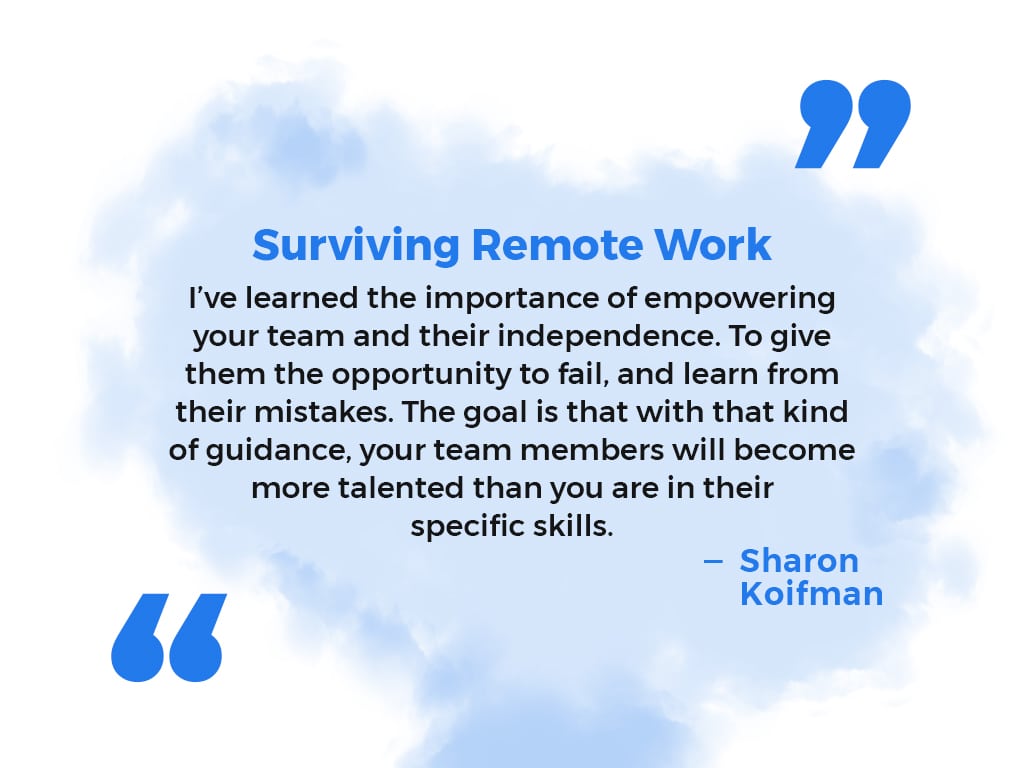
Are You Surviving Remote Work?
You could be Mr. multimillionaire fancy pants Sharon talks about in one of his chapters, or a guy working in their parent’s garage with a brilliant idea, or a remote work newbie who is learning how to use Zoom, and Surviving Remote Work is the perfect book for all.
Remote work doesn’t discriminate; it’s challenging for most people. And it is happening now. The famous phrase of remote work is the future is now obsolete. If you want to be successful, you need to be prepared and have the right tools.
This book is the tool you need to be prepared and understand the remote work dynamics. If you are a leader (or want to be one someday), you’ll learn everything about leading a remote team, from onboarding to managing to building trust and culture.
On the other hand, if you are a remote worker and feel overwhelmed by all these changes, there’s a whole section in the book about this. How to take care of your mental health, how to avoid distractions, and even how to land a remote job!
All these in one book!

